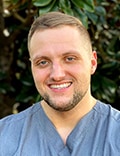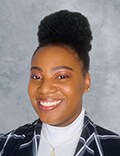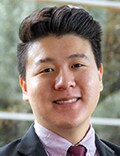The crescendo in the competitive race for residency positions reached its peak Friday in Match Day decisions that were high notes for some applicants but produced less than optimal outcomes for others.

Tyler Ramsey
Tyler Ramsey, among other fourth-year students (MS4) who matched successfully, got his second choice of internal medicine programs. “I am excited and relieved,” the 27-year-old told Medscape Medical News. “This is a fantastic opportunity.”
Ramsey, who attends Campbell University School of Osteopathic Medicine in Buies Creek, North Carolina, matched with a program about 4 hours away, Mountain Area Health Education Center in Asheville, North Carolina.

Alana Parker
Also matching into a North Carolina residency was fellow MS4 Alana Parker. “I was able to match into my first choice!” she told Medscape Medical News. Parker, who attends City University of New York School of Medicine, will be a psychiatry resident at Carolinas Medical Center in Charlotte, North Carolina.
“I worked so hard and I’m so happy that it’s finally showing,” said Parker.
The National Resident Matching Program (NRMP) announced that this year’s Main Residency Match had a record number of US MD and DO senior applicants and the largest number of total (39,205) and first-year (36,277) positions offered.
“While all categories of applicants saw improvements over 2021, US DO seniors achieved a 91.3 percent match rate, a 2.2 percentage point increase over last year, the highest on record for that group of applicants, and a rate on par with the match rate achieved for US MD seniors,” Donna L. Lamb, DHSc, MBA, BSN, NRMP president and CEO, said in a statement.
An Alternate Path
Those who didn’t match applied to the Supplemental Offer and Acceptance Program (SOAP), which offers unfilled positions to unmatched students.

Austin Kim
Austin Kim of Tulane University School of Medicine was among the MS4 students who went through SOAP. On Thursday night, he told Medscape Medical News, he matched into a categorical internal medicine program at Piedmont Macon Medical Center in Macon, Georgia. He had applied for residency in physical medicine and rehabilitation.
“I am not exactly thrilled to be in a different specialty than intended, but I can’t say I am disappointed in the slightest, and at least I can put all of this behind me and move on to becoming a physician.”
He told Medscape, “There’s a chance that I might reapply next year, but we’ll see.”
Several days earlier, he shared his initial reaction to not matching with Medscape: “It’s uh…. not a great time. Even after getting the decision [Monday], you don’t really have time to feel sorry for yourself just because of the amount of work that needs to be done as you find yourself applying to new programs and new specialties you may not even have a single care about.”
Twitter is filled with heartbreaking accounts of MS4 students who weren’t as successful in their SOAP experience. A prime example was a tweet from @OjaliUnedu: “SOAP has been indeed soapy. Not even a call or an email. What have I done to deserve this? Can I just be a doctor?”
Journey to Residency
Over the past few months, the 27-year-old Ramsey posted encouraging tweets for his fellow MS4 using #match2022. The tweets were a clue to the frustrations and anxiety of MS4, rising to a feverish pitch before this week’s Match Day today.
In February, Ramsey tweeted: “It only takes 1 person to give you a chance,” followed closely by, “When nothing feels certain, everything is possible.” In early March, Ramsey tweeted: “When the computer already knows where you matched, but you have to wait 15 more days.” And just last week he posted: “The intensifying anxiety that’s occurring as we approach next week is training me for residency. Sleep deprivation is no joke.”
The tweets were as much for Tyler as for his classmates. Medscape Medical News kept up with a handful of MS4 in the final weeks leading to Match Monday, when students learn if they had matched with a residency or not, and today, when they learn if they got their top choice of residency or close seconds.
Only one didn’t match and will pursue other options. Ramsey was one of the lucky ones on Match Monday, as he chronicled on Twitter: “No words can describe the amount of relief and excitement getting this email!”
He told Medscape, Match Monday’s results were “a huge relief and a massive burden off my shoulders!”
Ramsey understands the challenge of relinquishing some of the anxiety that accompanies “not knowing where you’ll spend the next 3 to 7 years of your life.” But he also realizes the decision has been out of his control since he submitted his rank list.
On Match Monday, Parker shared with Medscape the duality of fate. “I’m happy. This is everything I’ve been working for, but it’s also a bittersweet moment seeing all the qualified candidates that went unmatched.”
The past few weeks leading up to Match Day, she spent her time waiting for today’s results by completing her MedGradWishList, a mutual aid movement for underrepresented medical students to receive essentials, materials, and gifts to help them transition into their residencies.
Was she nervous? She contemplated for a moment before responding. “Yeah. I think I’ve gotten to the point where I’m more calm. It feels like this is what I’ve been waiting for. This feels like it’s more important than graduation day. All we want to do is get a job, be valued and learn as much as we can. It’s up in the air for two weeks and that’s very nerve-wracking.”
Virtual Interviews Times Two
Like others who shared their #match2022 journeys on Twitter, Ramsey’s tweets show his advancement through the matching process.
In November, he tweeted, “Maybe if I sing it as confidently as Mariah Carey, it will come true: ‘All I want for Christmas isssssss … MORE Interview Invites!!!”
Ramsey applied to more than 100 residencies. His list included 13 residencies, half of which are in North Carolina, where his family also lives, and the rest were located along the eastern United States from Massachusetts to Florida. He targeted academic centers, as opposed to community-based programs, because the former are more research oriented and lend themselves better to him landing a fellowship in the future.
Parker completed 50 applications and interviewed with about 11. “I think it went really well.” She said that despite the online interviews, she was able to determine if the programs were “genuine.”
She believes those who interviewed her were a good fit because they accepted her despite her bold personal statement about wanting to serve patients in the “hood.” For that reason, Parker said she’d feel comfortable training at any of the programs that interviewed her.
Three of the interviews were for programs in New York and the rest were elsewhere around the country. She said she visited most of the cities in which the programs are located.
Her priorities are a program that will help her continue her nonprofit organization promoting mental health awareness among children, offer community-based programs, and be located not far from family or friends.
While this is the second online Match Day, it’s the first time matching students such as Ramsey noticed some programs that did not use a grade threshold to judge applicants. That’s the result of the Step 1 exam changing to pass/fail this year. Although current fourth-year students would have received scores on their exams, program directors seemed to already be gearing up for the change and didn’t let poor scores count against applicants, Ramsey said
“In some of my interviews, they told me they are not screening anyone off that, in preparation” for the changes, he said. “It will be interesting to see how it affects chances of matching.” Ramsey is in favor of the change because it allows candidates to be judged holistically on their merits beyond a single test.
“A lot of people have testing anxiety and I do, too,” he said, citing one of the motivations of the test change policy. “I think it’s a really great thing. If you pass the exam, you are qualified to be a physician.” And there are plenty of other ways to evaluate whether a student is ready to be a doctor, he added.
Chances of Matching
Ramsey came to the match having gained national media attention for his research 2 years ago on lavender oil contributing to abnormal breast growth in young girls and boys. At the time, he was a postbaccalaureate research fellow at the National Institute of Environmental Health Sciences (NIEHS), part of the National Institutes of Health.
Ramsey said he was fairly confident he would match. “I feel like I’m a strong applicant and I hope it showed in the process. “If I don’t get my top 5, I will be disappointed, but I know the match is very competitive and sometimes requires a little bit of luck. I understand that sometimes it is completely out of my control. It’s something I’ve worked on over the years and learned to help manage.”
Of the online interviews, he said he thought he performed “decently well. It’s something that’s a challenge online and on Zoom.” In addition to the lack of personal interaction, he believes it’s difficult to form an impression in a 20-minute online assessment that will lead to a decision for the near future.
The benefits are that it’s less costly and allows for more interviews while not allowing candidates to visit in person and get a real feel for the location. Ramsey said he visited four campuses that required a long drive or flight.
And he was able to judge from online interactions between faculty and students whether the location suited him. “You are going to spend 75 to 80 hours working with these people. It’s almost going to seem like a family.” Ramsey said he wanted a sense of whether they’ll be warm, compassionate, and helpful to each other when no one is getting a lot of sleep.
If he hadn’t matched, Ramsey said he’d have considered SOAP or would have accepted a preliminary year offer before reapplying to match next year.
Parker also said she was confident she would match. If she didn’t? “I haven’t thought about it,” she said a few weeks before Match Day. “I truly believe I’m going to match. I try to keep that positive mindset through the whole journey.”
Pushed for a what if, she conceded she would SOAP. “Of course, it’s going to hurt at first…. In terms of my career, it’s going to go as it’s supposed to.”
In this case, the powers that be were in her favor.
For more news, follow Medscape on Facebook, Twitter, Instagram, and YouTube.
Source: Read Full Article